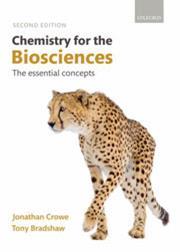Jonathan Crowe and Tony Bradshaw
Oxford; OUP 2010 2nd edition | Pp704 | £26.99 | ISBN 978-019-957-087-4
Reviewed by Linda Morris

In 2006 I reviewed the first edition of this book for Education in Chemistry. The second edition is still what it says - essential concepts for bioscience students, but several sections have been expanded, eg. enzyme kinetics, bonding, molecular interactions, acids, bases and buffers, chemical reactions and chemical analysis. This expansion of topics plus a reordering of chapters has, in my opinion, increased this text's usefulness in foundation courses. The addition of metals in biology to the biological macromolecules section, organic reaction mechanisms and expanded sections on spectroscopic analysis and enzyme kinetics in particular, maps more fully to the content of most foundation courses in chemistry for biosciences in the UK. This is a textbook that acknowledges that the type of student now studying basic chemistry and their background has changed and aims to give students opting to study life or bio- science degrees a sound foundation in the molecular basis of their subjects. Other general chemistry texts that are currently available still tend to go into too much depth for these students or assume too high a level of prior knowledge and many are intimidating in their presentation.
This UK text covers all the core areas including basic organic reactions using biologically relevant examples to illustrate each concept. The chapters are set out clearly with key concepts highlighted and self-test questions and answers interspersed throughout the chapters at timely intervals for the reinforcement of these concepts.
Other new features of this edition include a new Maths Tools section to aid students in the numerical skills required to carry out calculations. For tutors, there is a downloadable test-bank of questions and all figures from the text are available for use. For students also, the on-line resources available to accompany the text have been expanded to include quizzes with fully worked answers.
Anyone involved in a foundation chemistry course, especially for students with a limited chemical background, would do well to consider adopting this as a core text.






No comments yet